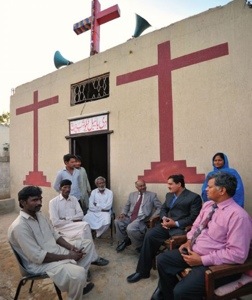Bible Overview Reading Plan–Psalm 27
“ONE THING I ASK OF THE LORD, this is what I seek: that I may dwell in the house of the LORD all the days of my life, to gaze upon the beauty of the LORD and to seek him in his temple” (Ps. 27:4). This glorious stance finds parallels elsewhere. Thus in Psalm 84:10-11 the psalmist declares, “Better is one day in your courts than a thousand elsewhere; I would rather be a doorkeeper in the house of my God than dwell in the tents of the wicked. For the LORD God is a sun and shield; the Lord bestows favor and honor; no good thing does he withhold from those whose walk is blameless.”
This is not quite the same as saying that the psalmist wants to spend all his time in church. The temple was more than a church building, and synagogue buildings had not yet been invented. This was a way of saying that the psalmist wanted to spend all his time in the presence and blessing of the living God of the covenant, the God who supremely manifested himself in the city he had designated and the temple whose essential design he had stipulated. This necessarily included all the temple liturgy and rites, but it wasn’t a fine sense of religious aesthetics that drove the psalmist. It is nothing less than an overwhelming sense of the sheer beauty of the Lord.
But there are two further connections to be observed:
(1) The psalmist’s longing is expressed in terms of intentional choice: “this is what I seek” (27:4, italics added); “Better is one day in your courts than a thousand elsewhere; I would rather be a doorkeeper in the house of my God than dwell in the tents of the wicked” (84:10, italics added). The psalmist expresses his desire and his preference, and in both cases his focus is God himself. We will not really understand him unless, in God’s grace, we share that focus.
(2) The psalmist recognizes that there is in this stance abundant security for him. While it is good to worship God and delight in his presence simply because God is God, and he is good and glorious; yet at the same time it is also right to recognize that our own security is bound up with resting in this God. David wishes “to gaze upon the beauty of the LORD and to seek him in his temple,” for “in the day of trouble he will keep me safe in his dwelling; he will hide me in the shelter of his tabernacle and set me high upon a rock” (27:4-5). “I would rather be a doorkeeper in the house of my God,” we read, for “the LORD God is a sun and shield” (84:10-11).
About This Blog
This blog is one of the primary ways that Christ Community's staff can connect and share information. Look for important updates on our community life here each week.
Visit the CCC Website.
View our Church Calendar.
Reminders & Reflections
Blog Archive
- June 2015
- May 2015
- April 2015
- March 2015
- February 2015
- January 2015
- December 2014
- November 2014
- October 2014
- September 2014
- August 2014
- July 2014
- June 2014
- May 2014
- April 2014
- March 2014
- February 2014
- January 2014
- December 2013
- November 2013
- October 2013
- September 2013
- August 2013
- July 2013
- June 2013
- May 2013
- April 2013
- March 2013
- February 2013
- January 2013
- December 2012
- November 2012
- October 2012
- September 2012
- August 2012
- July 2012
- June 2012
- May 2012
- April 2012
- March 2012
- February 2012
- January 2012
- December 2011
- November 2011
- October 2011
- September 2011
- August 2011
- July 2011
- June 2011
- May 2011



